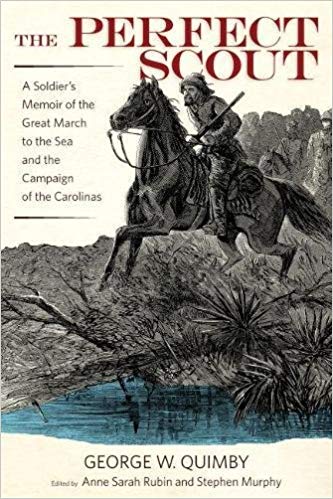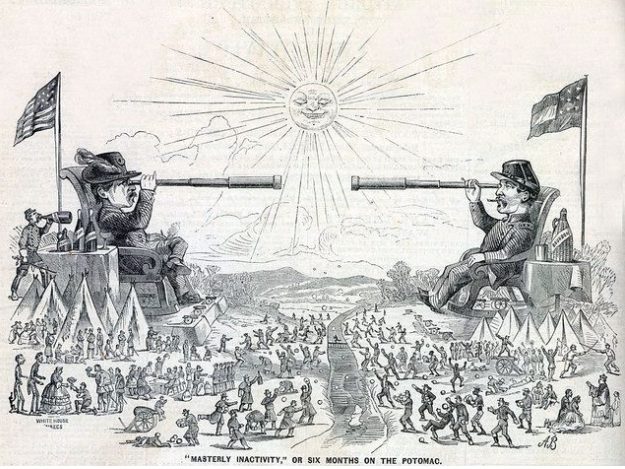The Perfect Scout: A Soldier’s Memoir of the Great March to the Sea and the Campaign of the Carolinas by George W. Quimby and edited by Anne Sarah Rubin and Stephen Murphy. University of Alabama Press, 2018. Cloth, ISBN: 978-0817319717. $29.95.
 Personal memoirs of men serving as scouts during the Civil War are in short supply. Scouting for Grant and Meade: The Reminiscences of Judson Knight, Chief of Scouts, Army of the Potomac, edited by Peter G. Tsouras, arrived on the scene in 2014. The release of The Perfect Scout is thus a welcome addition.
Personal memoirs of men serving as scouts during the Civil War are in short supply. Scouting for Grant and Meade: The Reminiscences of Judson Knight, Chief of Scouts, Army of the Potomac, edited by Peter G. Tsouras, arrived on the scene in 2014. The release of The Perfect Scout is thus a welcome addition.
The formal military term for scouting is “reconnaissance,” defined as a mission to obtain information by visual observation or other methods of detection about the activities and resources of an enemy or potential enemy—or about the meteorological, hydrographic, or geographic characteristics of a particular area (learning, for example, about the weather, watercourses, and terrain). During the Civil War, selective troops on both sides were called upon to perform duties as scouts, guides, couriers, and escorts. Gen. Robert E. Lee assigned 91 men of the 39th Battalion Virginia Cavalry to his headquarters prior to the Gettysburg campaign in June-July 1863 to perform these responsibilities for him personally, as well as for his three corps commanders. In other words, military commanders relied on men deemed to have special skills to fulfill these vital roles: conducting reconnaissance, guiding other personnel to specific destinations, delivering messages, and escorting personnel (usually officers) during special assignments.
George W. Quimby’s memoirs add insight into how scouting duties were carried out during the war, specifically when Maj. Gen. William Tecumseh Sherman’s army was marching through Georgia and the Carolinas in late 1864 and early 1865. Quimby’s manuscript, likely written in the early twentieth century, remained unavailable to the general public until Stephen Murphy, a descendant by marriage, salvaged these writings, and arranged with Anne Sarah Rubin, a professor of history at the University of Maryland, Baltimore County, to edit and publish them.
Born in Ohio and raised in Wisconsin, Quimby joined the 32nd Wisconsin Infantry Regiment at age 20 in August 1862. He served for two years as a foot soldier before becoming a scout at the beginning of Sherman’s “March to the Sea.” In his memoirs, Quimby reminisces about his experiences and relates human interest stories about the people he encountered while serving on missions in the field.
Sgt. Quimby was a member of a scouting unit under Maj. Gen. Oliver O. Howard, the commander of the Army of the Tennessee, and was paid a bonus of $150 a month (roughly equivalent to the salary of a major) out of a “secret service fund” for hazardous duty. During the five-month period of Sherman’s march through Georgia and the Carolinas, Quimby spent considerable time serving as a courier. He carried messages from one headquarters to another, at times over long distances and through dangerous territory.
Quimby and his fellow scouts normally donned Confederate uniforms, which helped convince Southerners to shelter and feed them along their route of travel. The scouts were aware, however, that if caught, they would be shot or hanged as spies. For protection, they carried two revolvers on their hips or snugly in their boots.
In addition to Quimby’s vivid description of his many hazardous experiences, this memoir provides insight into reaction of the local population as Sherman’s army swept across Georgia and the Carolinas. One of Quimby’s achievements was a lengthy trip by boat down the Ogeechee River past Fort McAllister as Sherman’s army approached Savannah. Their mission was to open communications with the Union naval fleet off the Atlantic coast and inform them of Sherman’s imminent arrival. As they did with most assignments, the Union scouts relied on slaves met along the way for shelter, and to guide them through enemy-held territory.
Later, Quimby paired with Sgt. Myron Amick in an assignment to deliver an encoded dispatch outlining Sherman’s marching schedule to Brig. Gen. Alfred Terry in North Carolina. Once more, with the help of “negroes,” the two men were able to travel through unfamiliar territory to reach their destination. For this accomplishment, Sherman paid each the princely sum of $500 ($8,000 in today’s currency).
It is fortunate that Stephen Murphy recognized the value of the wartime experiences of his wife’s ancestor, and arranged for their publication. This information will provide the Civil War community with a better understanding of the complexities and dangers faced by scouts, guides, couriers, and escorts throughout the conflict. A general audience will find that George Quimby’s narrative has all of the components of a mystery novel.
Thomas J. Ryan is the author of the multiple award-winning Spies, Scouts, and Secrets in the Gettysburg Campaign: How the Critical Role of Intelligence Impacted the Outcome of Lee’s Invasion of the North, June-July 1863. His latest book, written with co-author Richard R. Schaus, is titled Lee is Trapped, and Must be Taken: Eleven Fateful Days after Gettysburg, July 4-14, 1863. It is forthcoming from Savas Beatie.

